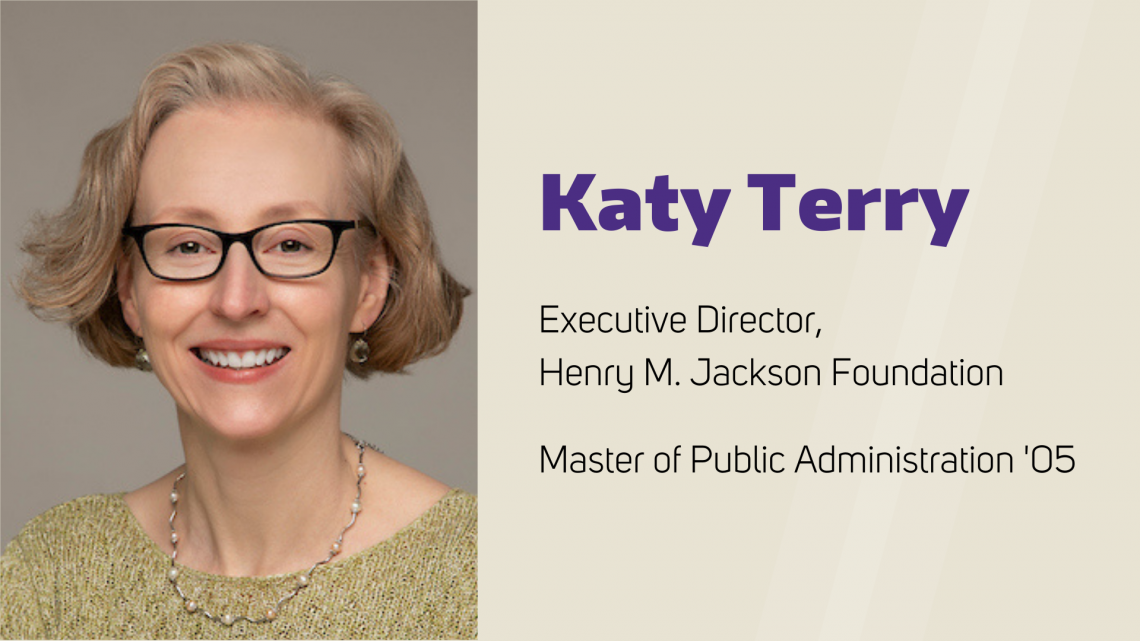May 17, 2021
Supporting Values-Based Leadership: A Q&A with Katy Terry (MPA ’05)
As the Executive Director of the Henry M. Jackson Foundation, what are one or two things you’d want everyone to know about your work?
Some know the Jackson Foundation through our grantmaking at UW, including the Jackson Environmental Fellowships at the Evans School. Fewer are aware of our other climate, human rights and civic leadership work. For instance, we were an early contributor to efforts linking climate change with national security, as a method to bring bipartisan support to climate action. President Biden’s climate agenda, with a climate seat on the National Security Council, is an exciting embodiment of this idea that we helped incubate. In addition, six years ago the Foundation started the Jackson Leadership Fellows program, to support early- to mid-career civic leaders through a program based on values-based leadership. The Jackson Fellows Network now includes over 50 Jackson Leadership Fellows, who are individually and collectively making a big impact in the community.
What’s a new, fresh approach you have brought to your job?
It’s relatively easy to gauge your effort, and harder to assess the difference you’re making, especially with big issues like climate change. Through strategic planning, we’re starting to articulate the impact we hope to make and assess how we’re doing. This is new for most of us, and it’s exciting to approach our work in a learning mode, rather than focus on perfection.
What do you think the state of your field/organization will be in 2030? What will be the same, and what will be different?
So much has changed in the last year, predicting 2030 is tough! I believe many aspects of the nonprofit and public sectors will be forged or influenced by this past year. I am hopeful that root causes and solutions will become the main focus of these sectors, to address the existential threats that we are facing, including systemic racism and climate change.
What contributed to your decision to pursue a career in support of the public good? Was there a defining moment in particular?
My family was oriented towards service (my father was a priest and my mother a teacher), and I expected to follow suit. Tutoring high school students while I was in college crystallized this for me. The students were risking a great deal for their education (under a regular threat of gun violence at a rough time in New York), and I was so inspired by them. It shaped how I think about education, my unearned privileges, and how individuals can make a difference.
What is your favorite podcast these days? What is a great book you have read recently? Or the “GOAT” (greatest of all time) book you’ve read?
I first read James Baldwin’s Another Country when I was just out of college and living in Russia. I was thirsting for English, and this book was so beautiful and crushing; it’s the only book I reread immediately on finishing it the first time. I read it again last year, and continue to find it startlingly modern and insightful about sexuality, race, art and relationships.
How does your Evans education impact how you approach your work today?
I took an elective on technology and nonprofits, which influences how I think about an organization’s resources. Once, the instructor described a client that was touting their use of a broken stapler, to prove fiscal responsibility. However, that stapler wasted staples, paper, and – most importantly – time, and replacing it would have cost ten dollars. Often staff time is not valued like things you go out and buy. Yet it’s central to how we accomplish our mission. I now try to be mindful about how we spend our time, and value small, low-tech changes that can better use our time and treasure.
If you could give Evans School students one piece of advice, what would it be?
My career path hasn’t been linear, and I’ve been wary of long-term career plans (I did the concurrent Jackson School program in Russian Studies and associate them with Soviet Five-Year Plans). Frequently, I had seemingly random responsibilities or jobs that felt like they were going nowhere, only to discover that I had gained experience that eventually opened doors. I highly recommend taking advantage of even short-term opportunities to gain new experiences and skills. They can be interesting challenges, and I wouldn’t have gotten my last several jobs without them.
We’d love to learn more about you and your tremendous contributions to the public good, so we can share your story as we connect, learn, and reflect. Share your story!
